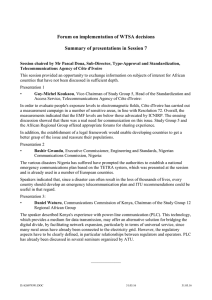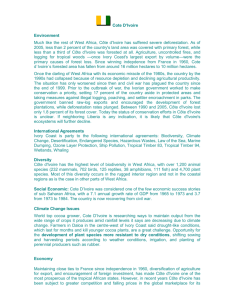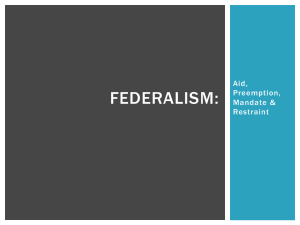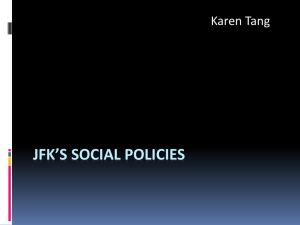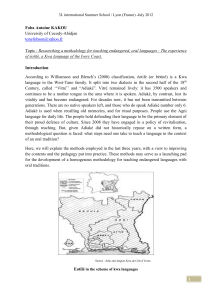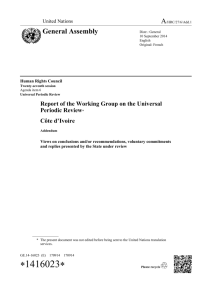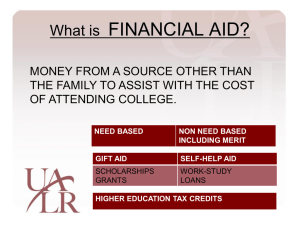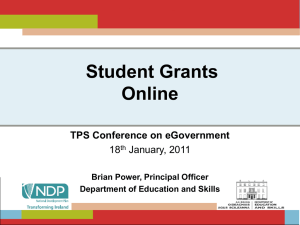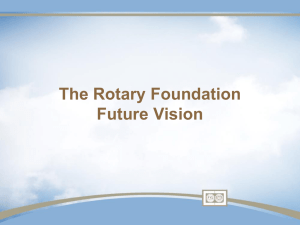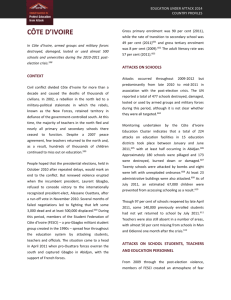Factors affecting quality education
advertisement
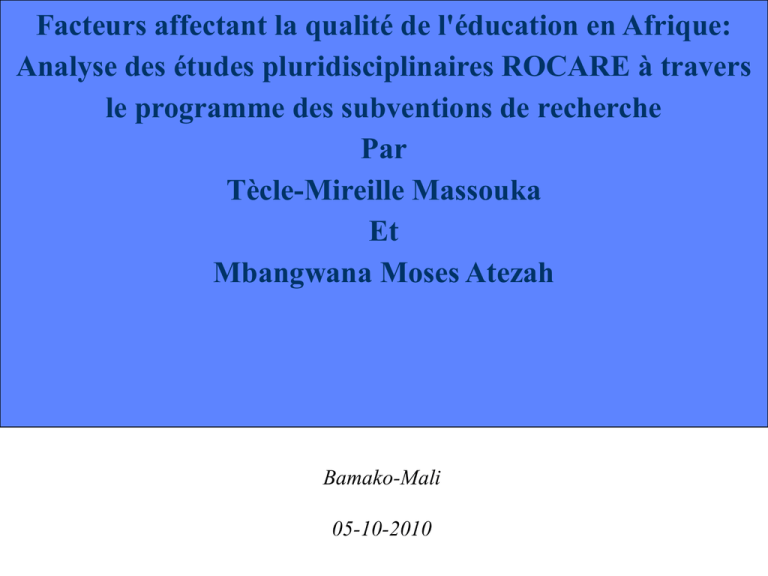
Facteurs affectant la qualité de l'éducation en Afrique: Analyse des études pluridisciplinaires ROCARE à travers le programme des subventions de recherche Par Tècle-Mireille Massouka Et Mbangwana Moses Atezah Bamako-Mali 05-10-2010 What is ERNWACA/ROCARE? ERNWACA is the acronym of Educational Research Network for West and Central Africa. It is a bilingual network (French/English), apolitical and non-profit-making Created in 1989 in Freetown with The aim is to promote educational research and African researchers To improve educational practice and policy. Vision, Mission, Objectives Vision is to give an African face to educational research in Africa. MISSION is to promote African expertise and a culture of research to improve education policy and practice. Objectives: Build national and regional capacity in education research; Conduct quality research pertinent for practitioners and decision-makers; Share findings to stimulate policy and public dialogue and advocacy; Strengthen ERNWACA partnerships with national and regional institutions. Membership ERNWACA brings nowadays together more than 700 members in 16 Francophone and Anglophone countries in West and Central Africa Benin, Burkina Faso, Cameroon, Congo, Côte d’Ivoire, Gambia, Ghana, Guinea, Mali, Mauritania, Niger, Nigeria, Central African Republic, Senegal, Sierra Leone, and Togo. ERNWACA members come from a variety of national institutions, Including universities, teacher training institutes, research centres, government and NGOs. What is the ERNWACA Grants Program? – The ERNWACA grants program is the largest ERNWACA program – It involves all 16 member countries – It is a unique Program that gives the chance to every ERNWACA member country to participate in order to strengthen their research capacities – The program is intended for doctoral researchers, teachers and administrators living in Network member countries. – The call for proposals is launched every January on the ERNWACA website and through the media and posters in member countries’ teaching and research institutions. Program objectives The aim of the ERNWACA Research Grants Program is to strengthen educational research capacity among researchers. Four specific objectives determine this grants Program: To train researchers in research methodology and scientific writing; To strengthen links between ERNWACA and institutions of higher education through co- tutoring of teams of researchers ; To strengthen inter-institutional collaboration in the sub- region ; To provide research results applied to ERNWACA and WAEMU/UEMOA priority themes of educational research that are likely to inform teaching policies and practice related to education. Role of the scientific mentor Ensure the quality of the scientific study ; Develop tools for data collection and field work; Guide the team for analysis of data collection and report writing ; Support the team to write scientific articles with the findings of the study; Orientate the team to submit the papers to conferences where they can present the research study; Participate in the validation of final report Participate in the organisation of ERNWACA Café with the research team and the national coordination for dissemination of the findings. Responsibilities of thematic resource person Direct by email the recipients, with regard to the theme of their domain of specialization; Comment on reports and articles related to their specialisation; Draft a synthesis of the stemming reports of one of the subjects. Workshops There are two types of workshops organised in the programme •Scientific workshop • Capacity building for authors with promising papers from the previous edition. The workshop helps the grantees to produce quality articles Methodology workshop Capacity building for research design, qualitative and quantative analyses of data etc Workshops and Particippants Year Workshops 2002 Particpants Resource Persons Trainers Mentors X X X X 2006 Methodology 24 4 1 24 2007 Methodology 21 2 3 21 28 3 4 28 25 3 4 25 30 4 4 30 & scientific writing 2008 Methodology & scientific writing 2009 Methodology & scientific writing 2010 & scientific writing Grants workshop In Yaounde Studies Already carried out in the Programme (109) Aperçu des études 25 24 20 15 13 13 Ens Sup Curriculum Skills Gender Peace ICT OMD HIV/AIDS Madrassas African Languages 13 11 10 9 10 8 5 4 5 0 Nombre Factors affecting quality education Studies in Côte d'Ivoire, Gambia, Niger, Senegal and Togo have highlighted the failure of the university to address its primary mission is to train tomorrow's intellectuals. The reasons for this doubt is based on many constraints currently affecting the system of higher education. These factors include: •Infrastructure •teaching materials, •inadequate quantity and quality of teachers •Large number of students Factors affecting quality education University Reforms Reform issues were addressed by researchers from Mali and Guinea, respectively: • Practical assessment, evaluation at the university and the adoption of the LMD system. •Weaknesses of evaluation are related to two main factors: •Malpractices by teachers and students •Inadequate training of most teachers in general pedagogy and assessment techniques. Factors affecting quality education Violence: Studies carried out in Côte d'Ivoire, Sierra Leone and Guinea. In Fourah Bay College (Sierra Leone) cultism was identified as a major problem that affects both students and teachers and as a result may reduce the interest and motivation of students to study. Sexual and physical abuse were identified in Higher institutions in Côte d’Ivoire and Guinea Conakry University strikes were predominant in many universities and in some cases bring about violence on school property. Factors affecting quality education •The emergence of private universities is a recent phenomenon in many African countries, • It was noted that in Côte d'Ivoire and elsewhere private universities still have the following problems: •Lack of teachers (part time teachers coming from public universities) •Lack of laboratory equipment (More theory than practice as a result our educational system does not adequately address African issues for problem solving) • Lack of innovation (teaching, evaluation, problem solving) Inability to use of appropriate indigenous resources adapted to the modern needs of our society •Lack of orientation ( poor admission creteria, ability of students to fit in the job market). Factors affecting quality education •Poor orientation was cited in studies carried out in Cameroon Burkina Faso, Côte d'Ivoire, Nigeria and Togo •Students were found to be doing courses without knowing exactly what is needed in the job market. •The lectures or contents do not pay attention to African needs •The inadequacy of current educational systems and societal needs. •Graduates cannot compete in the global economy. Factors affecting quality education •Studies carried out in the use of ICTs in Benin, Cameroon, Ghana, Senegal and Mali showed that many teachers and students do not make maximum use of the computers, Internet and Cell phones in the teaching/learning process. •Computers were taught as computer courses and not as pedagogical tools. •Internet use in many cases were used for social networking and not mainly as pedagical tools. •Intermittant electricity failures were noticed •Student and computer ratios ranged from 100:1 and above in many cases •Maitenance of computers and Internet were a major problem. •Distance education was a problem as result of lack of access to ICT facilities Dissemination of ERNWACA research results The ERNWACA grants programme dessiminate the results of the studies in the following: •Reports •ERNWACA cafes in all 16 national chapters (a form of policy dialogues) •Presentation at international conferences •AEDI (African Educational Development Issues) •ERNWACA website www.ernwaca.org/www.rocare.org •Presentation of reports to partners Sponsors of the ERNWACA Grants Programme International Development Research Centre (IDRC) 2002 Dutch Ministry of Foreign Affairs 2006-2013 West African Economic Monetary Union (WAEMU/UEMOA) 2006-2008 References Balde, I., Sawadogo, P.; Ilboudo Thombiano, E., ; Azankpo, R.;& N'dah, D. , ( 2007), Le patrimoine culturel dans l'enseignement en Afrique: état de la question au Bénin et au Burkina Faso / The cultural heritage in the education in Africa: state of the question in Benin and in Burkina Faso, ROCARE Bénin, 75p. http://www.rocare.org/grants/2007/Patrimoine_culturel.pdf Bourema, K., Sidibe, K., Traore K. D., (2007), Les pratiques d'évaluation à l'université de Bamako: forces et faiblesses, ROCARE Mali, 39p. http://www.rocare.org/grants/2007/ML_pratiques_evaluation.pdf Chebli, C.M., Mansary, A., Kadidjatu, H., Pepps Kallon, M., (2007), Cultism on university Campuses/ Cultes dans les campus universitaires, ERNWACA Sierre Leone, 59p. http://www.rocare.org/grants/2007/Impact of Cultism.pdf Diaouné,T. M., Millimono, T. N., & Cissé, S, Conté, S., (2008), Le LMD en Guinée et la problématique de la construction des compétences par les étudiants / The LMD in Guinea and the problem of the construction of the skills by the students, ROCARE Guinée, 41p. http://www.rocare.org/grants/2008/LMD en Guinee.pdf Etudor, E.; Akkpan, E. G., ; Usen, F. S., ; & Akpanumoh, U. D., (2007), Quality Delivery in University Education and Sustainable Development in Nigeria/ ERNWACA NIGERIA, 37p. http://www.rocare.org/grants/2007/Nigeria_Quality Delivery in Univ.pdf Goin Bi, Z.; N'Dede Bossoma, F.& Gokou Yode, (2007), Qualité et innovation dans l'enseignement supérieur: cas des universités privées en Cote d'Ivoire/ Quality and innovation in Higher Education: case of private Universities in Cote d'Ivoire, ROCARE Côte d’Ivoire, 43p. http://www.rocare.org/grants/2007/Qualite et innovation.pdf References Koutou N'Guessan, C., Acka-Douabele, C., Koffi affoue, P.; Kanon G., L.; & Ettien Ablan A.M., (2007), Les crises et les violences en milieu universitaire et leurs impacts sur les valeurs originelles de l'université / Crisis and Violence in Universities and their impacts on the original values of the University , ROCARE Côte d’Ivoire, 35p. http://www.rocare.org/grants/2007/Crises_violences.pdf Mbengue Nguimè, M., Tamibe Patale, S.; Yaoundam, E.; & Dili Palai, C. , (2007) , Université, NTIC et traditions orales au Nord Cameroun / University, ICT and Oral Traditions in the North Cameroon, ROCARE Cameroun, 53p. http://www.rocare.org/grants/2007/NTIC et tradition orales.pdf Onyene, V., Olusanya, O., Johnson, O., & Salisu, R., Auteur, (2007), Indigenous Productivity and Development: A Tool for a Sustainable Society / ERNWACA Nigeria, 20p. http://www.rocare.org/grants/2007/Nigeria_Indigenous orientations.pdf Souedat Mint,.F., Brahim Ould, A., Ivoukou Mint, A., Lemrabott Ould, M., & Sidi Mohamed O. A. , (2007), La formation scientifique des filles dans l'enseignement supérieur en Mauritanie: le cas de l'ENS de Nouakchott/ ROCARE Mauritanie, 64p. http://www.rocare.org/grants/2007/Filles_enseignement superieur.pdf Thanks for your Kind attention UNESCO 2010
